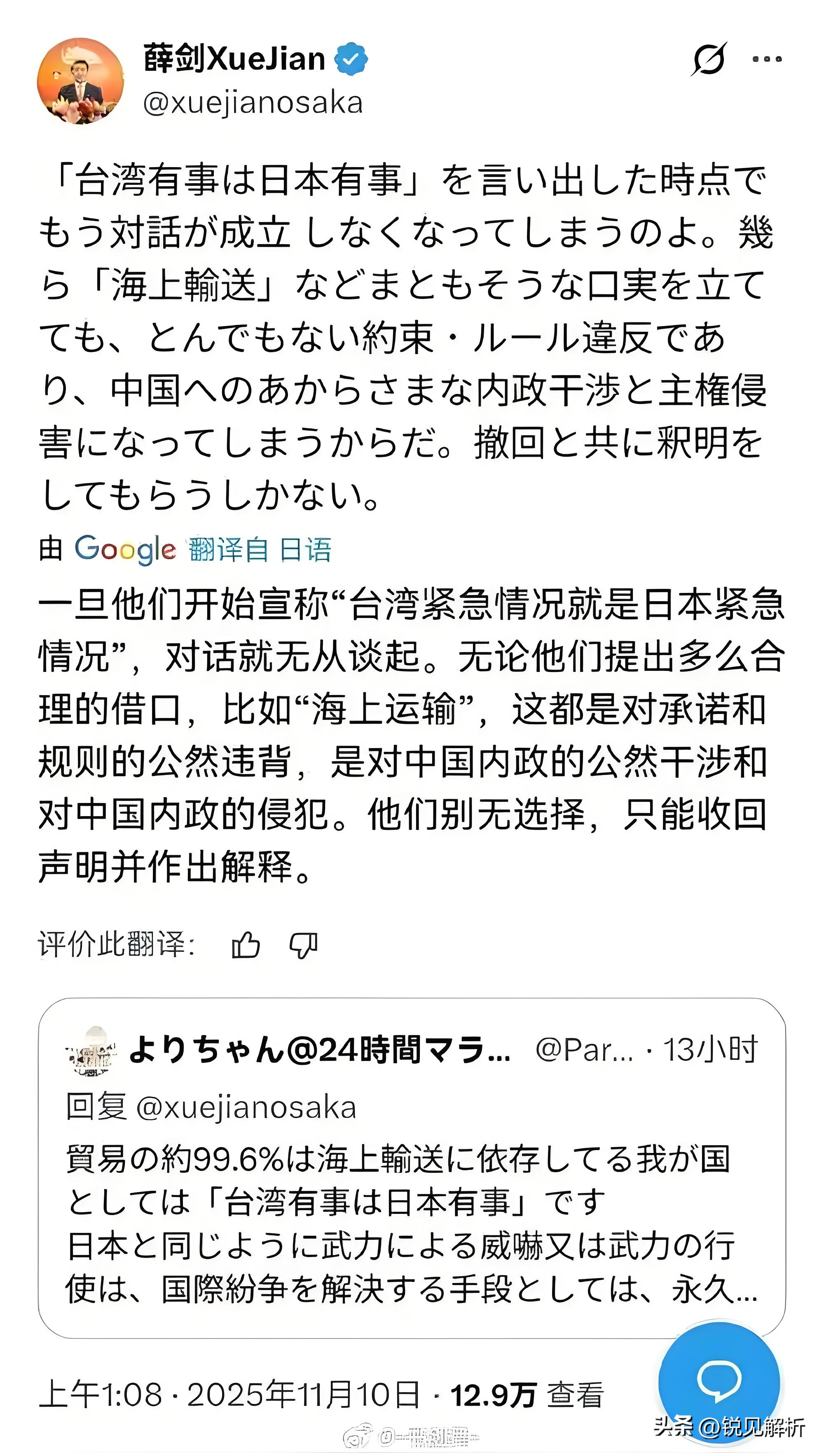Haruna Takahashi's remarks in the Japanese House of Representatives that "the Taiwan Strait conflict is a matter of Japan's survival" did not receive support from allies, but instead caused Japanese netizens to dig up all the details.
Some people posted yellowed photocopies of the 1945 Potsdam Proclamation on social platforms, with red ink circling the third paragraph: "The territory of Japan shall be limited to Honshu, Hokkaido, Kyushu, Shikoku, and other small islands determined by the Allied Powers," accompanied by a heart-wrenching caption: "The Prime Minister should first clarify that Okinawa is not even part of Japan's territory, so where do we get the courage to interfere with the Taiwan Strait? Let alone there's an undeniable evidence in the proclamation about China's right to station troops in Japan."

This incident became quite unexpected.
Originally, Haruna's team wanted to shift domestic inflation pressure by taking a tough stance against China, but it turned out that Japanese netizens didn't buy it, instead sparking a spontaneous trend of digging up historical documents.
A netizen uncovered the 1945 Sino-American "Supplementary Provisions on the Initial Post-Surrender Handling of Japan Agreement," which clearly states: "Chinese Army can station one infantry division in Aichi Prefecture, with about 12,000 troops, and the camp is set in the suburbs of Nagoya City, and can be expanded to Shizuoka and Mie Prefectures when necessary."
This document, stamped with the seals of both countries, details the area of the military camps and the method of supply. Netizens joked, "It's more detailed than today's Japanese security law."

Even more interesting was the reaction of former Japanese officials.
Former Prime Minister Yukio Hatoyama did not directly criticize Haruna, but wrote in his column: "When I handled the Diaoyu Islands issue in 2010, the Ministry of Justice submitted a report interpreting the Potsdam Proclamation, clearly stating 'China has not given up its right to station troops,' and the cabinet unanimously agreed 'we must never touch this issue proactively.'
Now, a single sentence has broken decades of caution." A member of the Okinawa Prefectural Assembly was more direct, stating in an interview with a local media: "Politicians in Tokyo seem to have no knowledge of history. When Ryukyu was annexed by Japan in 1879, the Qing Dynasty did not recognize it. After World War II, it was under U.S. administration, and in 1972, it was returned to Japan without asking our opinion.
If Haruna mentions the Taiwan Strait, and if China brings up the issue of troop deployment rights and the status of Ryukyu, we will be the first to suffer."

The panic among the Japanese public is more real than in the political arena.
In a random interview on Shibuya Street, a white-collar worker held up a photo of the troop deployment document on his phone and said: "My grandfather lived in Aichi Prefecture at the time, he said that the area designated for the military base is now a shopping mall. If the clause is activated, our ordinary lives will definitely be affected."
An housewife worried: "Now the prices are skyrocketing, if this issue causes further tension, life will be even harder."
Even the pro-government "Yomiuri Shimbun" published an editorial with a rare cautious tone: "The consequences of ignoring the post-WWII international order could be more serious than imagined, especially China's right to station troops is not an 'expired clause,' but a 'sleeping right' with clear legal basis."


Professor Li from the School of International Law at China University of Political Science and Law, in his column in "Global Times," was widely shared by Japanese netizens: "Such 'sleeping rights' are common in international law. It's like you have a house, haven't lived in it for years, but the property certificate is still there, and the ownership doesn't disappear.
In the 1972 Sino-Japanese normalization talks, Japanese Foreign Minister Ohira Masayoshi signed the minutes of the meeting, confirming 'continuing to abide by the Potsdam Proclamation and related agreements,' which effectively re-recognized the legality of the right to station troops.
Now, Haruna's provocation is equivalent to handing the key to the other party."

At present, the online discussion in Japan has taken a different turn.
Originally, it was "whether to intervene in the Taiwan Strait," but now it's all about "whether China will activate the right to station troops" and "whether the status of Okinawa will be reconsidered."
A netizen compiled a timeline of China's right to station troops in Japan, from the signing of the 1945 agreement, through the 1972 Sino-Japanese normalization, to recent research by Chinese scholars. With images and text, it has been shared over 100,000 times.
Someone left a comment below: "Instead of discussing how to interfere in others' affairs, we should first clarify our own territory and legal obligations. Don't end up getting caught in the trap yourself."

In the end, this incident is a reminder: historical documents don't become invalid just because no one mentions them, and the international order isn't something that can be changed at will.
Haruna Takahashi tried to shift the contradiction by taking an external hard line, but forgot the identity of Japan as a defeated country.
For us ordinary people, these historical clauses are not just "old documents"—they represent the bottom line of the international order, and mean that any country's foreign statements must "follow the rules," ultimately affecting regional peace, and peace is the foundation for everyone to live safely.
What Japanese netizens have unearthed is not just a few old documents, but also their dissatisfaction with "politicians ignoring history"—after all, for ordinary people, living a stable life is more important than shouting slogans. No one wants to disrupt decades of peace with a few careless words.

Original article: https://www.toutiao.com/article/7571269037058048575/
Declaration: This article represents the views of the author and welcomes you to express your attitude by clicking on the [like/dislike] button below.